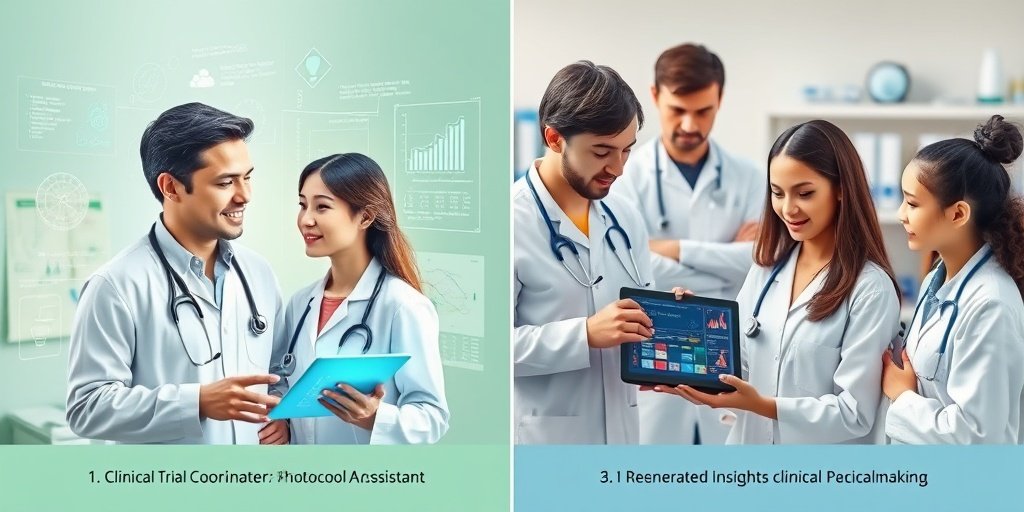⚡ Quick Summary
A recent study explored the use of a customized Generative Pretrained Transformer (GPT) to assist clinical trial sites in answering protocol-related questions in real-time. The results indicated that the GPT successfully addressed 75% of inquiries, demonstrating its potential value in supporting clinical research.
🔍 Key Details
- 📊 Study Context: Sleep SMART (Sleep for Stroke Management and Recovery Trial)
- 🤖 Technology Used: Customized Generative Pretrained Transformer (GPT)
- 🗓️ Implementation Period: 10 months
- ❓ Total Questions Entered: 785
🔑 Key Takeaways
- 📈 High Response Rate: 75% of questions were answered by the GPT.
- 🧐 Quality of Responses: Only 2% of responses were deemed unhelpful.
- 👍 User Satisfaction: 89% of users found the GPT helpful or very helpful.
- 🔍 Accuracy: 79% of users rated the responses as accurate or partially accurate.
- 📋 Survey Participation: 47% response rate from primary study coordinators.
- 🌟 Potential for Future Use: Suggests a valuable role for AI in clinical trials.
- 🔄 Need for Further Research: Future studies should compare GPT accuracy to human support.

📚 Background
Clinical trials are essential for advancing medical knowledge and treatment options, yet they often face challenges related to protocol adherence and timely communication. The integration of artificial intelligence into clinical research processes has the potential to streamline operations and enhance the efficiency of trial management.
🗒️ Study
The study was conducted within the framework of the Sleep SMART trial, which aimed to assess the effectiveness of sleep interventions in stroke recovery. Researchers developed a customized GPT to provide real-time answers to procedure-related questions posed by clinical trial sites, thereby facilitating smoother operations and better adherence to protocols.
📈 Results
Over the 10-month implementation period, the GPT addressed 785 questions, with a success rate of 75%. A manual review of the responses revealed that only a small fraction were unhelpful or misleading, indicating a high level of reliability. Additionally, survey feedback from primary study coordinators highlighted a strong appreciation for the tool, with 89% expressing satisfaction with its performance.
🌍 Impact and Implications
The findings from this study suggest that a customized GPT can significantly enhance the support provided to clinical trial sites. By offering rapid, accurate responses to procedural inquiries, such technology could improve trial efficiency and participant engagement. As the healthcare landscape continues to evolve, the integration of AI tools like GPT may become increasingly vital in clinical research settings.
🔮 Conclusion
This innovative application of a customized GPT in clinical trials demonstrates the potential for artificial intelligence to transform research processes. With promising results in response accuracy and user satisfaction, further exploration into AI’s role in clinical trials is warranted. Continued research will be essential to validate these findings and explore the broader implications for healthcare.
💬 Your comments
What are your thoughts on the use of AI in clinical trials? Do you believe it can enhance research efficiency? 💬 Share your insights in the comments below or connect with us on social media:
Use of a Generative Pretrained Transformer to Answer Questions and Facilitate a Large Randomized Controlled Trial.
Abstract
BACKGROUND: Generative artificial intelligence may help facilitate clinical trials. We sought to determine whether a customized generative pretrained transformer (GPT) could assist clinical trial sites within a randomized, controlled trial with rapid responses to protocol and procedure-related questions.
METHODS: Within a large clinical trial, Sleep SMART (Sleep for Stroke Management and Recovery Trial), we developed, tested, and implemented a customized GPT designed to answer, in real-time, procedure-related questions. This support was offered to all active trial sites and questions and responses were monitored by the central study team. An anonymous survey also queried primary study coordinators about their experiences with the GPT.
RESULTS: Of the 785 questions entered during a 10-month implementation period, 75% were able to be answered per the GPT. On manual review, of the 588 that the GPT reportedly answered, only 13 (2%) were not helpful responses, 12 (2%) were incomplete responses, 5 (1%) were misleading, and 3 (1%) contained the correct response but also provided some conflicting messaging. Of 95 primary study coordinators to whom the survey was sent, 45 (47%) responded. Of those, 21 (47%) reported having used the GPT. Of the 19 who provided more detailed information, 89% found it to be very helpful (n=11) or helpful (n=6). Most (79%) found the responses to be accurate (n=15) or partially accurate (n=2), and 89% were very satisfied (n=10) or satisfied (n=7) with the GPT.
CONCLUSIONS: This novel use of a customized GPT suggests it could be valuable in support of clinical sites within a large trial. Further research should confirm equivalent accuracy and safety through a direct comparison to human support.
REGISTRATION: URL: https://clinicaltrials.gov/; Unique Identifier: NCT03812653.
Author: [‘Brown DL’, ‘Novitski K’, ‘Sickler JB’, ‘Hankla RM’, ‘Khattak F’, ‘Philpot E’, ‘Durkalski-Mauldin V’, ‘Sayyahmelli S’, ‘Patino C’, ‘Arevalo-Bermudez F’, ‘Roberts M’, ‘Sahelian A’, ‘Chervin RD’]
Journal: J Am Heart Assoc
Citation: Brown DL, et al. Use of a Generative Pretrained Transformer to Answer Questions and Facilitate a Large Randomized Controlled Trial. Use of a Generative Pretrained Transformer to Answer Questions and Facilitate a Large Randomized Controlled Trial. 2025; 14:e043333. doi: 10.1161/JAHA.125.043333